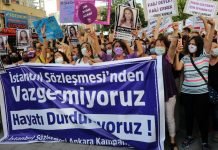The number of Turkish women suffering from domestic violence surged after some 90,000 convicts were freed under an early release law and the onset of the COVID-19 pandemic. Women’s rights movements are joined by Turkish Twitter users in fighting back.
Ahmet Ü., an ex-convict who was recently let out of prison after an early release law was passed, shot Nargül Yıldız dead in the city of Konya last Sunday. The suspect had 44 criminal offenses on his record, including extortion, causing bodily harm, theft and drug dealing.
Nurcan Polat was murdered in the city of Diyarbakır on May 30, 2020. According to a report in the Evrensel newspaper, the suspect is Polat’s husband H.P., who was recently released on early parole under the new law. Her neighbors claim that Polat was forced by her husband to move to a different neighborhood. She was murdered only three days after settling into her new home. The suspect is still on the run.
In another incident, Fatih S. took his 4-year-old daughter and 7-year-old son hostage using an assault rifle after his wife, Alev S., left home due to domestic violence. The children were rescued after the police and his wife persuaded him to surrender. Fatih S. was let out of prison after passage of the early release law.
Similar stories keep appearing in the news. Domestic violence was already one of the most important human rights issues in Turkey. The number of Turkish women who have suffered from domestic abuse surged 50 percent, from 145,000 in 2015 to nearly 220,000, in 2018, according to Interior Ministry data. Things got worse after thousands of convicts were released early with the new legislation. Women’s advocacy organizations say victims were not informed in advance about the release of those who had committed domestic violence against them.
According to Ömer Faruk Gergerlioğlu, a deputy from the pro-Kurdish Peoples’ Democratic Party (HDP) and a prominent human rights defender, the law was drafted in a rush to decrease the prison population without releasing political prisoners. But Gergerlioğlu says the problem runs much deeper: “Prison rehabilitation programs are not sufficient. Authorities do not concentrate on how to rehabilitate inmates in such a manner that they won’t commit crimes once they are free. … These people are already prone to committing crimes, and the rehabilitation programs to decrease that risk are not adequate.”
To make matters worse, as many women are stuck at home with potential abusers and minimal access to support, domestic abuse has intensified during the pandemic. According to an April survey by a Diyarbakır-based organization that was published by the Ahval news website, violence against women in Turkey increased 28 percent in the first weeks of the lockdown, while the Istanbul police recorded a 38 percent increase in domestic violence in March.
Most advocacy groups agree that a key reason for Turkey’s domestic violence problem is the failure of the Justice and Development Party (AKP) government to implement relevant laws, particularly the Istanbul Convention and a 2012 law to curb violence against women. But as Melek Önder of “We Will Stop Femicide” said: “Women in Turkey are now awakening. They are protesting. There’s a huge women’s movement in Turkey. They want the same rights as men.”
Turkish Twitter users have come up with a humorous way of highlighting the gender stereotypes and bias found in everyday language. On Saturday many women took to Twitter to share their accounts of discrimination, harassment and conservative gender roles by turning male-dominant stereotypes upside down, using the hashtag “Men, know your place” (#ErkeklerYeriniBilsin).

A woman tweeted: “A man should not laugh in public. He must be modest.” Others criticized the gender stereotypes that give women only a motherhood role: “The most beautiful career for a man is fatherhood” and “My husband can work if he wants.” Some local authorities soon joined the trend. The Bodrum Municipality boasted of public lighting which would mean that “Men can wander the streets safely,” while the Sisli City Council in Istanbul jokingly trumpeted the arrival of pink male-only buses.
The release law, which provided the possibility of early parole or house arrest for a broad range of offenders yet excludes political prisoners, among whom are tens of thousands of journalists, lawyers, politicians, academics, human right defenders and civil servants indicted or convicted under the country’s controversial and broadly interpreted anti-terrorism laws, has been harshly criticized.
















